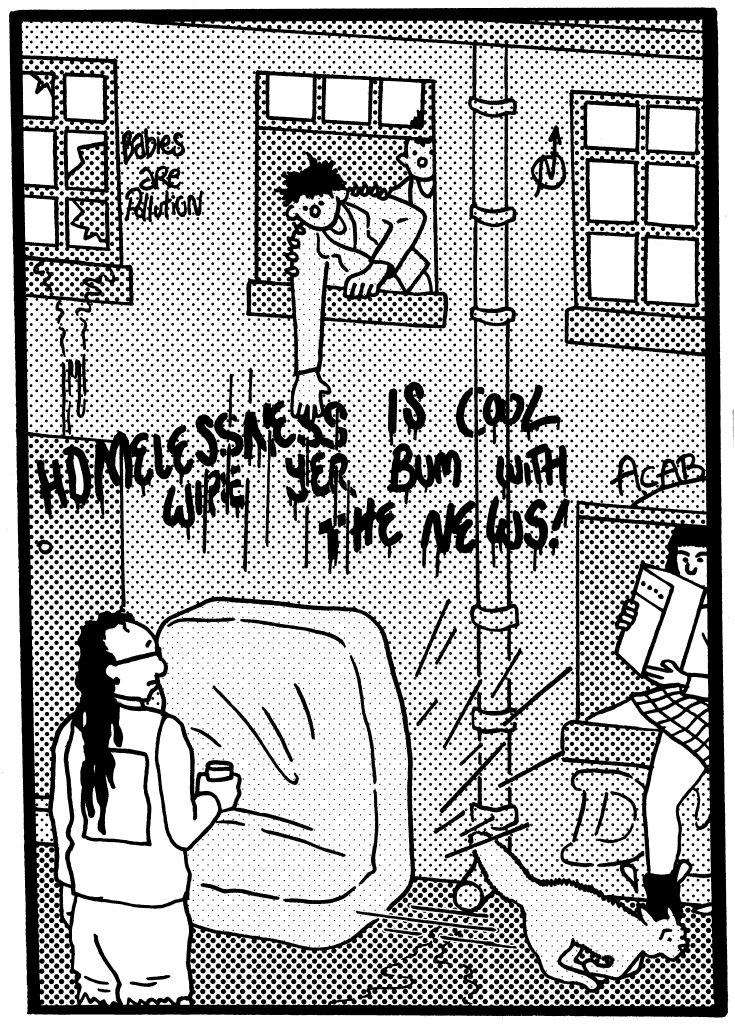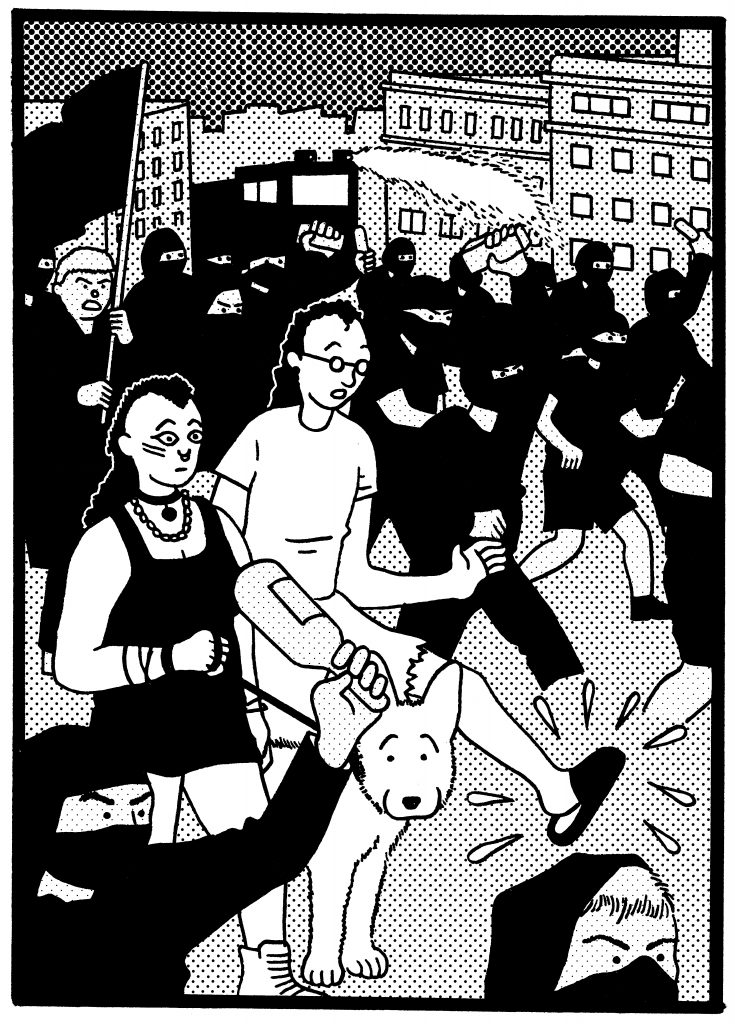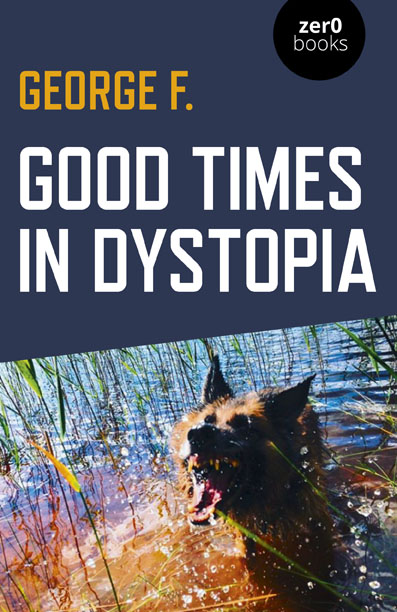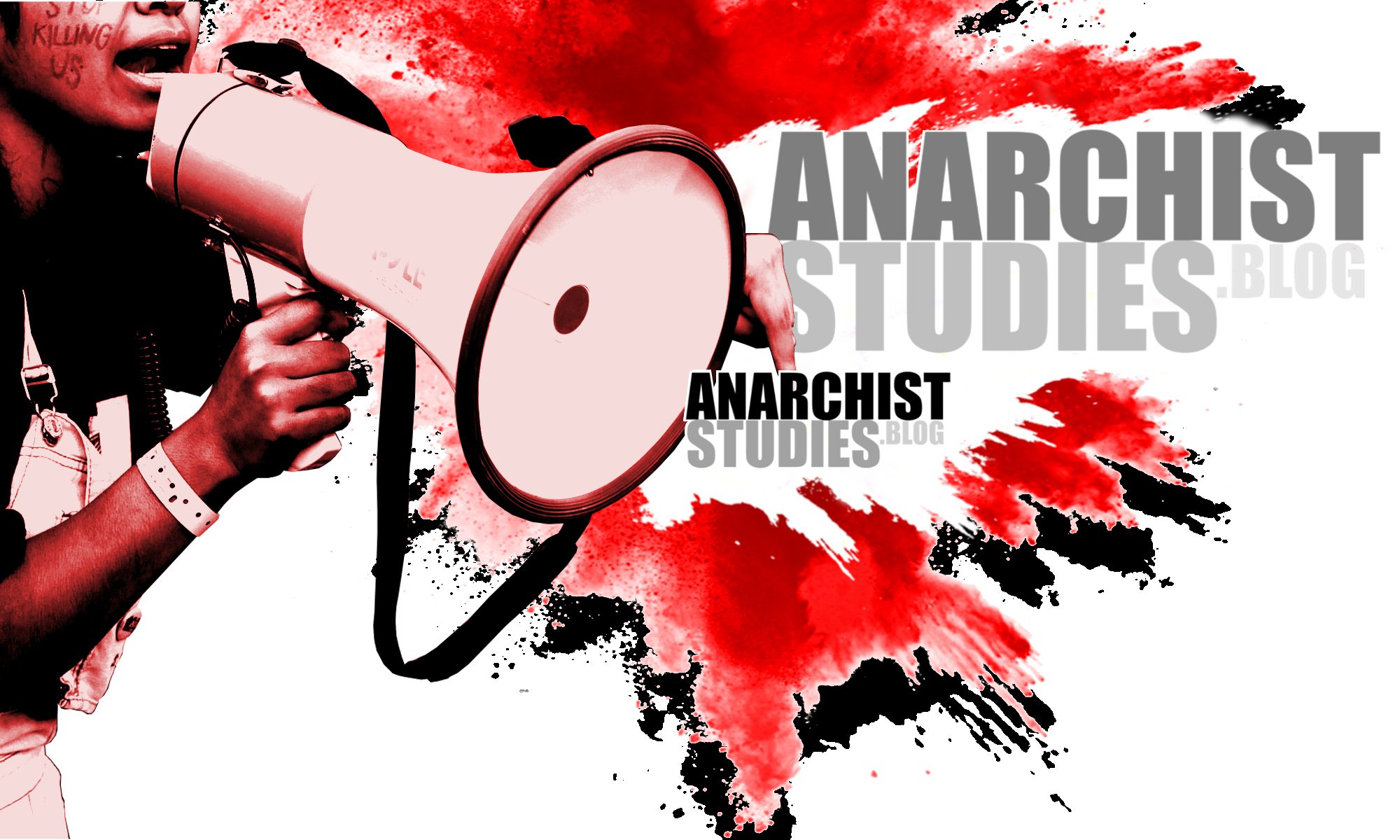Rowan Tallis Milligan in conversation with George F.
19th August 2019

Evoking the narrative style and furious pace of beat generation writers, Good Times in Dystopia is not a story in the traditional sense, nor is it a straight-forward memoir. If I had to compare it to an artistic form it would verge closer to a mural or a heavily graffitied underpass: you can see traces of what went before and layers of history, people, and creativity, but the overall effect is that of colourful chaos. Speaking to George, they explain how this stylistic approach is linked to their identity as a punk and an anarchist:
To me, punk is anti-authoritarianism and DIY culture: the idea of being self-directed and self-reliant in the creation of an aesthetic, and a critique of dominant ideologies. I’d definitely be coming from the fine edge of where punk and anarchism cross over, so I’d be looking at the history around anarcho-punk and around the rejection of any authority but yourself. The idea that we become the best judges of where authority and power lie. In my terminology they are very, very close together, a lot of punk attitude or the punk way of being crosses over with anarchism in lots of ways. However, I do hang around with a lot of people who totally reject the idea of punk as being stupid, as being commercialised, as already being a dead form. It’s evolved and progressed way beyond punk, but we understand punk collectively as a touchstone of DIY culture, anti-authoritarianism and interesting haircuts.
In this context I ask George how they see the individual and the collective working together in this ideology and way of life:
Ideally as a constant dialogue and interchange that values the role of the individual and the collective equally and sees that one constantly interacts with the others. I think there’s a strong tendency to either be individualist or collectivist to a very strong degree within both anarchism and punk. For me there’s that value of the individual within the collective but without putting one above the other, trying to find where is the most interesting and liberating point of dialogue and exchange between those two forms of being.
Conceptually one could argue Good Times fits into the emergent genre of what has come to be termed “auto-theory” – a form of queer-theory-cum-memoir that has grown in prominence since the 2015 publication of Maggie Nelson’s The Argonauts, which challenges the distinction between detached, “objective” academic analysis and personal experience. It would be difficult to finish Good Times in Dystopia without both a sense of intimacy with George F.’s experiences and an outrage towards governments, corporations, and tools of exploitation and gentrification which are rife throughout Western Europe. George explains how they see the relationship between the person, collectives, and what they call “creative nonfiction”:
A lot of the dialogue, the story and the ideas come from other characters we meet. A lot of it is other people’s perspectives and points of view. I’m privileged enough to have the skills of English, writing and access to put together a book, but to include lots of other people’s voices and stories and experience. That also anonymises them. The idea is it becomes bigger than the individuals within it, becoming about collective stories and how they’ve become part of our collective narrative.
This is why it’s put under “creative nonfiction”, the idea was not to be academic. The book has come out as “memoir”, but you know, I think it would be closer to “autofiction”. The idea was to create alternative narratives, stories that aren’t being told and aren’t being collected, but which are important for a culture of resistance. This is a continuation from my first book, Total Shambles, which creates a London identity of squatting that in this book expands to different points across Europe. A lot of people connected with it because those stories were their stories, even if it wasn’t their specific story.

Tonally, Good Times is very different from Total Shambles (Influx 2015). Where Total Shambles is a playful trip through the oddballs and accidents of living on the edge in London, Good Times strongly evokes the dystopia referenced in its title. From the very beginning it is visceral: references to sex, excrement, bodily fluids and drug use are littered throughout – at times people down on their luck quite literally shit into pizza boxes and deposit them on the street. These references, and others that I will leave the reader to explore, can make Good Times a challenging read. But they also contribute to what makes it worthwhile. You are drawn into a world of mental illness, hopelessness, and paranoia just as much as you are cheerfully roped into trips to clandestine French communes and exuberant street parties. I ask George about the tonal shift since Total Shambles:
I wanted to be more honest. I became very aware of my own mortality and much more open to the idea of exposing what I was experiencing, also because it connects with what a lot of people are experiencing. The idea was to break taboos, to talk about things that aren’t really talked about. Within our circles of friends and culture in general, what’s been really great to see is more and more comfort with talking about very, very distressing things. That paralleled with how on an inner level there is this anxiety, depression, suicidal thoughts, and on an outer level there is ecological collapse, domination, police brutality. The idea was to find that mirror because those became the conversations that we were having.
You won’t walk away from Good Times with a shrug and a “what are they like, these scamps!” Instead you are forced to contemplate the realities of violence towards homeless people, squatters, protestors, and other defenders of autonomous ways of living. This violence is multi-form – bailiffs, police, passers-by: all are complicit in the hostility towards those attempting to scrape by on the margins and George F. weaves this critique into their narrative so seamlessly that outrage at the injustice feels natural rather than manufactured. Yet, you are also left with a sense of the power and potential in resistance. And this is why punk and creativity are so important to George:
Punk is an outward projection of resistance, the idea of resisting with the body, with the aesthetic, with the music, a culture of resisting that has become commercialised and co-opted in a lot of ways, but is still linked to an ideology such as anarchism that carries with it a great deal of depth and resilience. Through our creative acts, through this tension of creation and destruction we can actually sustain and nourish ourselves, but it’s through accepting the dark side, the trash and the despair as well as the utopian ideal of what it can be.
Good Times in Dystopia is a powerful and raw and necessary read and I would recommend it to anyone interested in first-hand accounts of squatting and autonomous living – so long as they have a strong stomach.

George F. is a writer, anarchist, and boat-dweller. Good Times in Dystopia will be published by Zero Books on 13th December, 2019.
Rowan Tallis Milligan is an independent researcher on housing, anarchism and gender and a former squatter – @rowantalks
